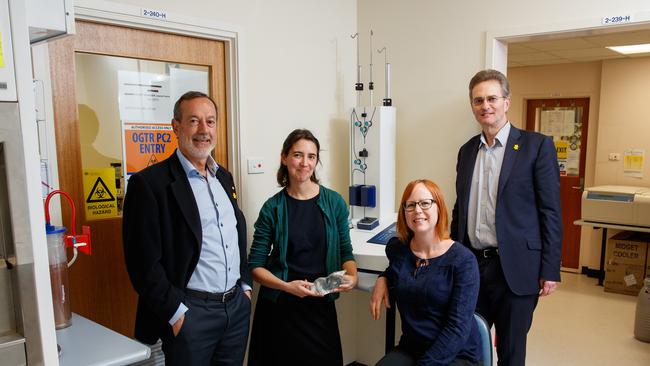$80m world-leading cancer research and treatment institute for Adelaide
World-leading genomic cancer profiling and treatments will be available in South Australia for the first time at a new $80 million research institute to be housed in Adelaide’s medical precinct.
- Research the key to understanding cancer
- SA researchers in national team to find and destroy dormant cancer
World-leading genomic cancer profiling and treatments will be available in South Australia for the first time at a new $80 million research institute to be housed in Adelaide’s medical precinct.
Hailed as a revolution in fighting the deadly disease in our state, the South Australian immunoGENomics Cancer Institute will target breakthrough discoveries and new tests and procedures for adults and children.
A brain drain of scientists and researchers is also expected to be stemmed by the Cancer Institute training doctors in new research disciplines.
Health Minister Greg Hunt said the $80 million federally funded independent institute, to be housed in North Tce’s SAHMRI2 building from 2021, would enable patients to receive world-leading cancer treatment closer to home.
“Cancer is a major universal health problem and among the most challenging of diseases to treat,” he said. “The fight against cancer will benefit from greater integration of SA’s cancer researchers, many of whom are already individually recognised as leaders of international cancer research in their own right.
“Coupling cancer researchers locally with cancer institutes nationally and internationally will help foster faster diagnosis, better therapies and, ultimately, cures.”
About 4000 South Australians die each year from cancer, with more than half of these being claimed by a rare and less common cancer.
Mr Hunt said the SAiGEN Institute would provide genomic profiling of rare and uncommon solid and blood cancers, clinical trials of CAR-T cell therapy for brain cancer patients and develop antibody and small molecule therapies for breast cancer.
Chimeric Antigen Receptor-T cell therapy involves taking white blood T cells from cancer patients, genetically engineering them before intravenously returning them to the patient. The CAR-T cells then home in on cancer, attacking and killing the cells.

Renowned clinical immunologist Professor Ian Frazer, recognised as the 2006 Australian of the Year for co-inventing the cervical cancer vaccine, said the institute would bring SA in line with international standards.
“It will bring to the patient’s bedside many of the diagnostic and curative breakthroughs already happening in the rest of Australia and the rest of the world,” he said.
Professor Michael Brown, the RAH’s Cancer Trials Unit director and University Adelaide’s Professor of Medical Oncology, said the institute would put SA at the forefront of cancer research and treatment. “We’d like to cure cancer. We have that ambition – we aim to do it through research and world-leading treatments,” he said.
“We want to provide the opportunities to researchers and for innovative treatments to patients here. Often we lose researchers because of a brain drain,” he said.
Centre Alliance senator Stirling Griff, who lobbied to get SAiGEN off the ground, said the cancer centre would be a game-changer for SA patients and significantly contribute to cancer research more broadly.
“I am proud to have worked with such talented cancer physicians and scientists to help bring the SAiGEN Cancer Institute to life,” Senator Griff said.
“SAiGEN’s collaborative and novel approach to cancer research and treatment will help to one day eradicate this insidious disease and will make a world of difference to South Australian cancer patients, and those beyond our state and national borders.
“And as a new independent entity, with world-class health and biomedical research capability and capacity, SAiGEN will also complement the Australian Bragg Centre for Proton Therapy, for which Centre Alliance (previously the Nick Xenophon Team) helped secure for South Australia in 2017.”
Professor Angel Lopez, Head of Human Immunology at SA Pathology said “This will ensure a future for cancer researchers by keeping the best talent and attracting other excellent researchers and funds from outside the state.”
Construction will start soon of North Tce’s SAHMRI2, which will become a 14-floor BioMed City building, and is expected to be finished in 2021 to house the Cancer Institute and the Australian Bragg Centre for Proton Therapy.
